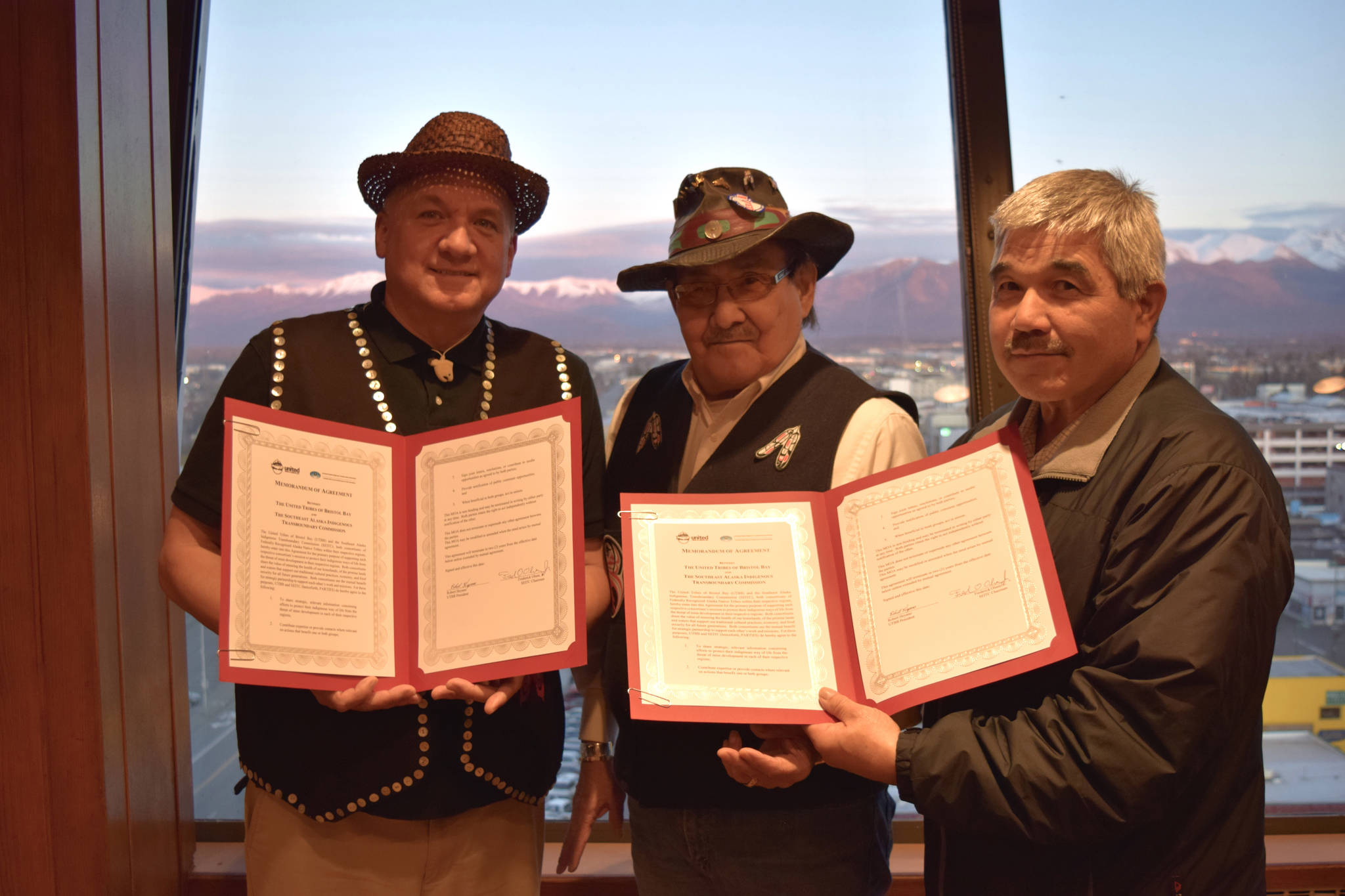Southeast and Bristol Bay tribal mining opposition now has a unified front.
Two Alaska Native tribal consortiums announced a “historic” partnership Wednesday at the Alaska Federation of Natives conference in Anchorage. Tribal groups representing a majority of the indigenous peoples in Southeast and Bristol Bay will work together to oppose mining projects in both regions.
The Juneau-based Central Council of Tlingit and Haida Indian Tribes of Alaska (CCTHITA) and Douglas Indian Association (DIA) are part of the agreement.
The United Tribes of Bristol Bay (UTBB), which represents 80 percent of the 14 Yup’ik, Denai’na, and Alutiq indigenous communities in Bristol Bay, signed a Memorandum of Agreement (MOA) with Southeast Alaska Indigenous Transboundary Commission (SEITC), which represents 15 of the region’s 19 tribal organizations.
The intent is to “formalize their efforts to protect their indigenous ways of life and the watersheds that sustain them,” the groups wrote in a release.
SEITC has worked to halt British Columbia mining projects which could threaten water quality on four cross-border salmon rivers in Southeast Alaska. UTBB has opposed the embattled Pebble Mine, a project proposal they believe threatens the world’s largest sockeye salmon run.
Together, the groups represent 29 Alaska Native tribes.
“Our tribes are under siege, but the unification of our people is a powerful move to defeat these toxic projects,” UTBB President Robert Heyano said.
“With this agreement, we hope to amplify our voices throughout Alaska and across the Canadian border and together we can preserve our way of life for generations to come,” SEITC Chairman Frederick Otilius Olsen, Jr. said.
The groups will share information and work together to halt what they call “mega mines,” runoff from which could pollute salmon habitat and would need to be contained in perpetuity.
When reached by phone Thursday, Olsen Jr. said the agreement couldn’t come at a better time. Efforts to open the Pebble Mine in Bristol Bay have resurged after a new proposal was released earlier this month.
The gold and copper mine would be built at the headwaters of Bristol Bay, where 56 million sockeye salmon spawned this year. It’s the most valuable salmon fishery in Alaska.
The first Pebble Mine plan was rejected by the Environmental Protection Agency on the grounds that it constitutes a risk to Bristol Bay salmon.
“Pebble Mine is a vampire that won’t die,” Olsen Jr. said. “I guess somebody took the stake out of its heart and it won’t die, so we’ll try and support them when we can.”
Opposition to so-called transboundary mines in Southeast is quickening, Olsen Jr. added, as municipalities, the Alaska House of Representatives and Alaska’s congressional delegation in Washington, D.C. have all formally asked the federal government to mediate water quality concerns.
There aren’t currently any enforceable protections for Southeast’s salmon rivers should Canadian mine runoff impact water quality.
“Our frustration that the mines we’re fighting are in another country, so it’s up a notch,” Olsen Jr. said. “We’re limited in many respects with what we can do and that’s one of the reasons we continue to push for federal involvement.”
Alaska currently works with British Columbia through Lt. Gov. Byron Mallott’s Transboundary Working Group.
“It’s cute the neighborhood watch we use in the state and province, but we need the police,” Olsen Jr. said, referring to the federal government.
SEITC’s member tribes are: CCTHITA, Chilkat Indian Village, Craig Tribal Association, DIA, Hydaburg Cooperative Association, Ketchikan Indian Community, Klawock Cooperative Association, Metlakatla Indian Community, Organized Village of Kake, Organized Village of Kasaan, Organized Village of Saxman, Sitka Tribe of Alaska, Petersburg Indian Association, Wrangell Cooperative Association and Yakutat Tlingit Tribe.
UTBB member tribes are: Togiak Traditional Council, Twin Hills Village Council, Manakotak Village Council, Curyung Tribal Council, Ekuk Village Council, Clark’s Point Village Council, Aleknagik Traditional Council, Portage Creek Village Council, New Stuyahok Traditional Council, New Koliganek Village Council, Levelock Village Council, Nondalton Village Council, Pilot Point Tribal Council and Chignik Lake Tribal Council.
• Contact reporter Kevin Gullufsen at kevin.gullufsen@juneauempire.com or 523-2228.

